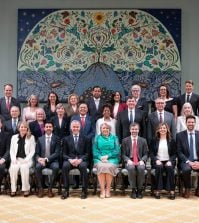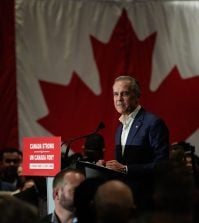Letter from Ottawa: Foreboding descends on Canada’s capital

November in Canada is always a challenging time for keeping spirits up. The days quickly grow shorter and colder. The rites of autumn involve putting away summer things, closing up gardens, and digging out winter gear, knowing it will be a long time before warmth and greenery return.
This year most Canadians felt an extra psychological blow when they saw that Donald Trump won the American election after all. Yes, he has some admirers and apologists here, but most public and “elite” opinion either leans to an affinity with the Democrats or simply has trouble getting into the mindset of the 75 million Americans who saw this man as fit for their highest office.
The outcome is stirring worries that go beyond what Trump may do to America to what the future holds for the world. Democracy and pluralism seem to be in deep trouble. Canada has a particularly close connection to Ukraine and promised support “for as long as it takes”. There have been other troubling developments that have rattled Canada’s self-confidence. Canadian society has been roiled this year by the conflict in the Middle East and more recently by an outbreak of tensions between different elements of the large Indian diaspora. Our own model of multiculturalism is being stressed by these international currents and by concern that immigration levels soared to untenable levels over the past few years. Canadians have been pessimistic about the state of their own country and the world since about 2022. Last week won’t have helped.
Upcoming webinar | 19 November: US election: how federal government is getting ready for the new president
Existential relationship
It is difficult to convey to others how existential for Canada the relationship with our southern neighbours is. It matters far more to us than to them. There are vast flows of goods, services and travellers across the border. Successive governments of all stripes have committed enormous effort to managing the many facets of our interaction: trade and investment, defence and security, energy, air and water pollution, migration and border controls, labour markets, cooperation in international geopolitics, and much more.
Accordingly, a good slice of the Canadian public service, both federal and provincial, thinks about and works on issues directly tied to the Canada-US relationship. It will be struggling to help our political leaders adjust to the results of the American election, trying to draw on experiences from the first Trump mandate but also to assess what is new and what may be a more enduring shift in how the Americans think and act.
For many public servants, they will first have to set aside a personal dismay and put on their best professional game face, trying to be clear-eyed about the challenges, the windows of opportunity that may arise, and above all how best to defend Canadian interests and values.
Our politicians will be doing their own assessments, looking for nuggets of wisdom in the avalanche of post-election op-eds, academic and expert commentary, and paid consultant advice. How much of what happened to the south of us is transferable to how best to fight a Canadian election that is months away?
Read more: Next steps for government transformation: Canada’s digital leaders issue a call to action
Canada’s election
It is a bit early to make confident predictions about how Canadians will now perceive their upcoming choices. Will the change of government in Washington shake up what has seemed to be an inexorable slide toward a change of government in Canada? For now, the most likely outcome in Canada is still a smashing victory for the opposition Conservatives, who would return to power in 2025 after a decade away. Whether to add the adjective “centre-right” or “populist” as a prefix is a question worth debating.
A dwindling band of supporters see a chance for prime minister Trudeau to come back from a massive deficit in polling as the best choice in the new context. Other Liberals who a few weeks ago were looking for hope in pushing for a change of leader were likely taken aback by the failure of Kamala Harris to outpoll Joe Biden. Conservatives would take heart from the wave of anti-incumbent national elections in 2024 and be confident their turn is coming.
For the federal public service, domestic politics is another source of foreboding. The older cohorts have been through changes of government before, and are more sanguine, but a surge of post-pandemic hiring means that a large share of public servants are new. The new cohorts and many of the new managers appear to be anxious. In part this is because the Conservatives have said little of substance about their policy intentions so there isn’t a lot to latch onto and prepare for. For example, we know they will repeal the federal carbon tax but not much about what, if anything, they will do about climate change instead. The days of long party manifestos seem long gone.
But mostly the foreboding around the public service, especially in the capital where about 40% of it lives and works, is because it is commonly expected that the party’s slogan “fix the budget” means deep cuts to programmes and personnel as soon as the first Budget – much deeper cuts than the tepid efforts of the current government. The thing is, there are very few clues about where the cuts will fall, so everyone can feel nervous. Younger workers will bear the brunt of downsizing unless the algorithms change.
Read more: How Canada is using data to turn good intentions into climate action
Adapt and serve
I said in my last letter that it is time for a deep pruning of the federal state in Canada. I firmly believe it is possible to do so and achieve gains in public sector productivity and effectiveness that will help rebuild confidence from voters and taxpayers. But whether we take that path, or repeat past mistakes that damaged long-term capabilities, is far from certain.
Clarity will emerge soon enough, whether it is Trump’s opening moves, or the election here in Canada. The public sector will do what is always has done, adapt and serve. For now the shortening days and dropping temperatures are a time for reflection and assessment, and as we do here at this time every year, hunkering down and getting ready to make the best of it.






















I agree that the public service is too bloated at ever level.It is no different than a large business that starts to fail it’s investor owners and brings in new leaders to makes radical changing to reinvent the firm.